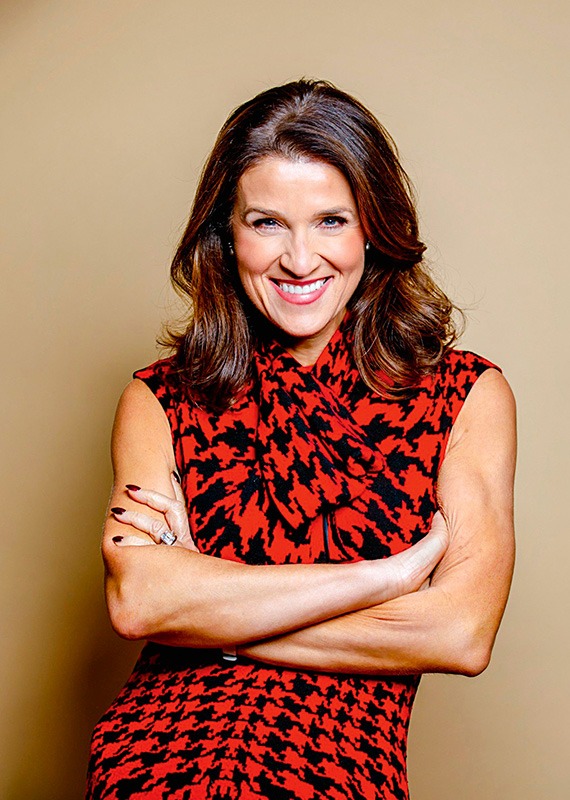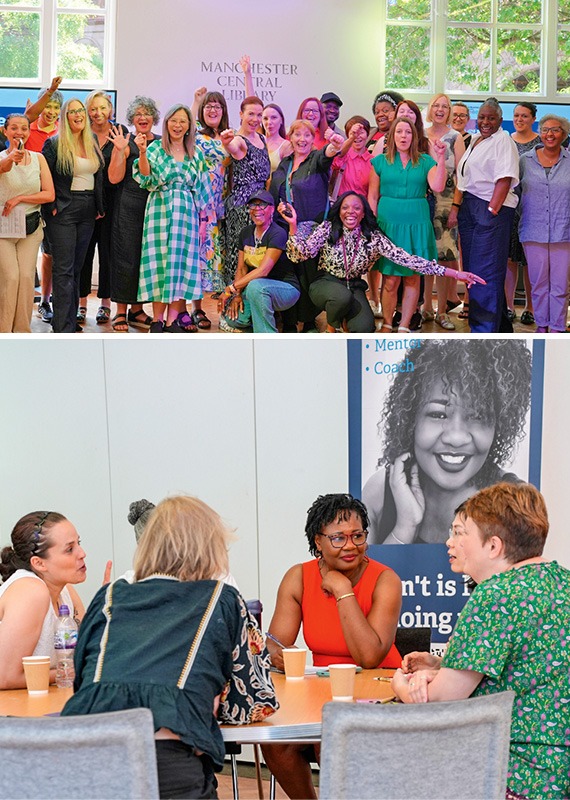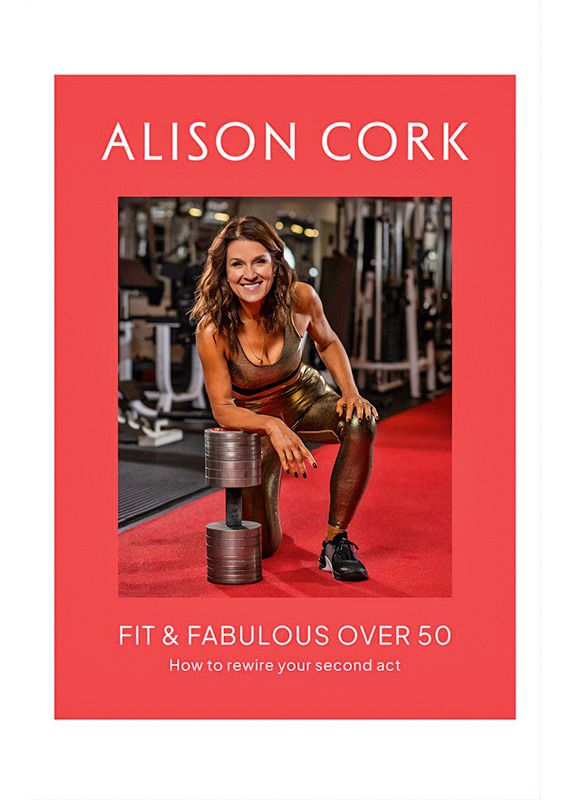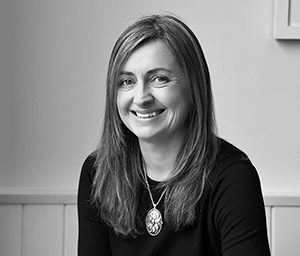In 2023 Alison Cork was awarded an MBE for services to female entrepreneurship. She tells us about her life in business, and the initiatives she has launched to help other women to succeed in a male dominated world
 Alison Cork
Alison Cork
In her Cambridge University exit interview, British entrepreneur, writer and broadcaster Alison Cork’s director of studies at Newnham College said to her: “Alison, we’ve all had a good chat about you… The bad news is that not one of us has any clue what you’re going to do in life. The good news is that not one of us is worried about you.”
Indeed, she didn’t know herself, other than being certain of the fact that she did not want to follow her friends down more traditional career pathways. “Parallel to that I had got myself into debt,” she explains. “I wanted to impress my dad by passing my driving test without him knowing, but the problem was I kept failing. I failed five times and in doing so I spent all my student grant and was left without any money. I was too embarrassed to ask him for more, and I knew he didn’t have any to give, so I thought, right you have to do something very quickly to make up this shortfall.”
What she did was to start self-publishing restaurant guides for university towns. “I drew a map of the town, and I sold adverts to restaurants and set them around the map,” she tells me. “I got the restaurants to pay me £40 per week each, which was quite a decent sum of money. And I typeset the ads by myself, by hand, which was an immensely laborious process in those days. Then I printed 10,000 copies, and I stood on major tourist roads and gave out these free maps that had restaurants all around the edge of them, and it worked like a dream.”
 Through initiatives like Make it Your Business and National Women’s Enterprise Week, Alison supports female business owners, something she is incredibly passionate about
Through initiatives like Make it Your Business and National Women’s Enterprise Week, Alison supports female business owners, something she is incredibly passionate about
The experience taught her not only that she enjoyed the process of being creative and solving a problem, but also that she was differently wired. “A penny dropped, and it reinforced the idea that I was never going to be a lawyer or an accountant; I might not have known what I was going to be, but I knew it was going to be something determined by me,” she recalls.
Alison went on to co-found Carnell Ltd, a mail order publishing company, which was floated on the London Stock Exchange in 1994. “It was immensely exciting, because it made me the youngest ever female co-founder of a publicly quoted company. I was about 29 at the time, so that was a definite career high, and it came early,” she reveals. “I think what I really enjoyed was the confidence that it gave me. Ironically, I was the only woman on the board, and I could see that it wasn’t going to be a lot of fun… I remember at the stockbroker lunch when we floated the company, I literally wasn’t addressed once. It was outrageous… At that time, men were def nitely educated and brought up to expect that they would be businessmen, but it was much less likely that a woman would go into business, and those that did often found themselves marginalised in business conversation.”
It was this realisation that persuaded Alison to leave Carnell and pursue a career in writing and broadcasting. “Publishing wasn’t necessarily my real passion, although I love writing and I’ve since written six books,” she tells me. “I thought, what is it that gives me the greatest pleasure. And it was my home environment. I looked across the Pond and saw Martha Stewart, and I thought that’s it: I’ll be the British Martha Stewart! I didn’t have any skillset in this field, but I managed to talk my way into writing and presenting a series on ITV called Home in the Country, which broadcast in the late 1990s and was filmed in my cottage in Wales. I’ve presented lots of programmes since, but that was the one that I absolutely loved, because it was completely original material. I wrote it all… the recipes, everything. All the creative ideas came from the heart, and that passion clearly communicated to the viewer, because to this day, and I mean to this day, and we’re now 30 years on, I have people coming up to me, telling me that it was the thing they most enjoyed watching on television. For me, the things that have given me the greatest enjoyment over the years are the things that I have felt most passionate about.”
Something that Alison is incredibly passionate about is encouraging other women to fulfil their business dreams. “I’ve been around a while, and it struck me that the stats hadn’t changed materially in terms of female role models in business,” she explains, “there weren’t enough women running their own business. We do make up half the population; we are theoretically half of the economy and therefore the economy cannot fi re on all cylinders if we are not there as part of the equation. That’s just common sense. So, I thought, well why aren’t women running their own business? And I looked into the reasons, and I found it was often down to a lack of confidence, lack of networking, lack of role models, lack of access to finance. And I thought, well, none of these are insurmountable problems.” From this realisation, Make it Your Business was born, a not-for-profit nationwide initiative to encourage and support women to start or grow their own business.
Women do not think they are inferior
to their male counterparts
“I wanted to create regional networking events where local women could see other local women who’d actually started their own business,” she explains. “So often we are London centric in this country, and it’s not very helpful for a woman in Grimsby who’s struggling to start her business there to be told that in London it’s all hunky dory. I just felt that it was important that it was local women supporting and encouraging other local women. And that has actually been its greatest strength, because it gives women the confidence to feel that it genuinely can be achieved. The other golden rule of those networking events is that they be truthful, so I say to the panellists, ‘It’s lovely to hear of your success, but we want to hear it all’. We’d rather hear about the challenges and failures, because that’s when people can assess the reality of running a business, which is definitely not plain sailing. So that sort of honesty is really, really crucial. If anybody ever tells you they just woke up, had an idea, executed on it and then exited for lots of money, they are probably lying!”
Off the back of this came National Women’s Enterprise Week. “I thought women in business didn’t get enough recognition. And I thought, well we jolly well need to put that right – we need to draw attention to female founders and support them,” Alison says. “That’s what National Women’s Enterprise Week is all about. We organise an accelerator; we run a national competition, and we fund 10 places, all expenses paid, for women to come to London and harness their distinctive ideas and vision and shape them into a pioneering and successful start-up. At the end of an intensive three days, we host a showcase where they have the opportunity to pitch their scale up to venture capitalists and angel investors. They may or may not receive investment, but the experience and contacts are completely invaluable.”
Currently, female founders only get about two per cent of VC funding, and Alison believes this is thanks to the fact that VCs are majority male led. “They view the investment through male eyes and may undervalue the product or the person in favour of a man. There’s statistical evidence to prove that,” she explains. “But women themselves do not think they’re inferior to their male counterparts, and in fact, all the statistics tell us that investment in female founded businesses delivers up to a 35 per cent better return than investment in male-led businesses.” Why does she think that is? “Women have a different approach to business; I think it’s a certain realism,” Alison says. “Most women have a longer-term vision of what it’s going to take to nurse their company to success. They don’t think about what they’re going to sell it for before they’ve even started being revenue generating. Women do have a slightly different approach to business, they can be more cautious, but actually being more cautious can be an advantage in business, it means that you’re less likely to fail.”
Where success and failure are concerned, with so many profitable ventures to her name, Alison would know better than most. Would she do anything differently if she was starting out now? “I am starting out again, as it happens,” she reveals, “because I have just decided to launch a new product, which is in the healthy eating market. I’ve always been a bit of a loner and pretty much run businesses on my own, but I think this time around I’d really enjoy collaborating with somebody – in fact, I do have somebody particular in mind… There is that phrase: if you want to go fast, go solo, if you want to go far, go in a team. I’d like to just experience what it’s like to work as part of a bigger team, because it’s something I’ve done less of.” Team work does make the dream work, as they say..
 |
||
Alison’s new book Fit & Fabulous Over 50 is available in hardback and eBook from alisoncork.com/shop-products. Fabric readers can use code FABULOUS20 for a 20 per cent discount |

